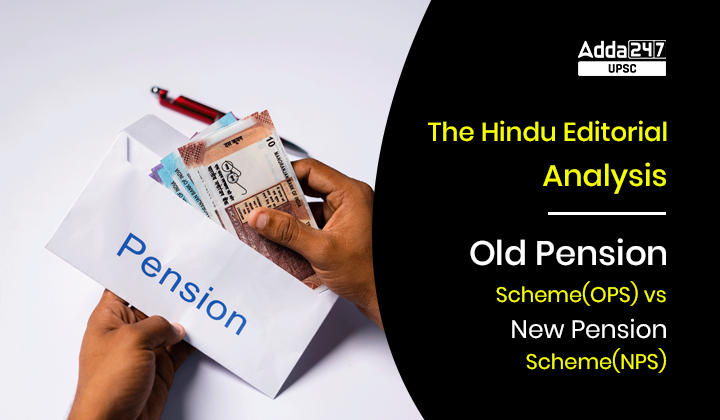Table of Contents
What is OPS vs NPS Issue?
- This year, Opposition-ruled Chhattisgarh, Rajasthan, Jharkhand and Punjab announced that they would restore the OPS. In the recent Himachal Pradesh Assembly elections, the OPS has emerged as a key poll issue as the hill State is home to many government employees.
- Recently, the newly elected Chief Minister of Himachal Pradesh, Sukhvinder Singh Sukhu, reiterated that the Old Pension Scheme (OPS) will be restored in the State and if this happens Himachal would now become the fourth State to do so.
Also Read: Census as a Mirror of Past and Present- The Hindu Editorial Analysis
Background
Old Pension Scheme (OPS) guarantees pension at 50% of the last drawn basic pay and the promise of the return of OPS in H.P. strengthened the Congress party as government employees and retirees form a significant portion of the hilly State’s electorate.
Also Read: The Hindu Editorial Analysis: Rising Rural Manufacturing in India
Why OPS is Government staff’s Favorite?
- The OPS or the Defined Pension Benefit Scheme assured life-long income post-retirement, usually equivalent to 50% of the last drawn salary
- Government staff prefer the OPS scheme as it allows them to avert their contribution of 10% of their basic pay and dearness allowance towards the employee pension funds, as envisaged in the National Pension Scheme (NPS) since inception in 2004.
- The pension under NPS remain static and there is no Dearness Relief to compensate the price rise /inflation as available in the OPS.
- For example, under the NPS, the official with a basic pay of ₹30,500 received ₹2,417 as monthly pension as against the ₹15,250 pension he would have been given under the OPS.
Know about National Pension System (NPS)
- The Atal Bihari Vajpayee government in 2003 decided to discontinue the OPS and introduced the NPS.
- The scheme, applicable to all new recruits joining Central Government service (except the Armed Forces) from April 1, 2004, is a participatory scheme, where employees contribute to pension corpus from their salaries, with matching contribution from the government, and is market-linked.
- Except West Bengal, all States implemented the NPS.
OPS vs NPS: Difference
| OPS | NPS |
| OPS was prevalent before April 2004 | National Pension Scheme replaced the OPS with effect from April 1, 2004. |
| Under the old pension scheme, retired employees received 50% of their last drawn salary as monthly pensions. | In contrast, NPS is a contributory pension scheme under which employees contribute 10% of their salary (Basic + Dearness Allowance) and the Government contributes 14% towards the employees’ NPS accounts.
The funds under NPS are managed by PFRDA-approved pension fund managers. |
Which is Better for Long Term Health of States: OPS or NPS?
| Risks Associated with OPS | Benefits Associated with NPS |
|
|
|
|
|
|
|
|
Also Read: What is the Latest Amendment in Wildlife Protection Act (WLPA), 1972? | Today’s Editorial Analysis
What should be done?
- Breaking a consensus on pension reforms and reverting to OPS amounts to an imprudent option as it will only benefit organised government sector employees, increase the fiscal burden of carrying these payments and take up a significant portion of the State’s budget, thereby curtailing its outlays on general welfare as a whole.
- The Congress led UPA government had indeed taken forward the pension reforms by the previous NDA regime and this is how the NPS has become relevant over the years. So, it should not again go for shortcuts for taking immediate political mileage.
SPARSH: System for Pension Administration
You may also find these Useful:
(Recent Editorial Analysis by our team at Adda247)
FAQs on OPS vs NPS Debate
Q. When it was decided to discontinue OPS?
The Atal Bihari Vajpayee government in 2003 decided to discontinue the OPS and introduced the NPS.
Q. What is NPS?
- National Pension Scheme (NPS) is a government-sponsored pension scheme. It was launched in January 2004 for government employees.
- A subscriber can contribute regularly in a pension account during her working life, withdraw a part of the corpus in a lumpsum and use the remaining corpus to buy an annuity to secure a regular income after retirement.
Q. What is PRAN under NPS?
National Pension System (NPS) is based on unique Permanent Retirement Account Number (PRAN) which is allotted to every subscriber.
Q. Who manages funds under NPS?
Ans. The funds under NPS are managed by PFRDA-approved pension fund managers.




 TSPSC Group 1 Question Paper 2024, Downl...
TSPSC Group 1 Question Paper 2024, Downl...
 TSPSC Group 1 Answer key 2024 Out, Downl...
TSPSC Group 1 Answer key 2024 Out, Downl...
 UPSC Prelims 2024 Question Paper, Downlo...
UPSC Prelims 2024 Question Paper, Downlo...




